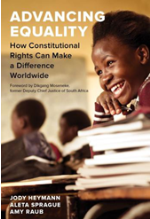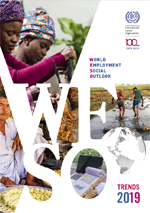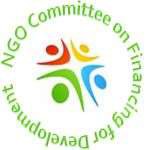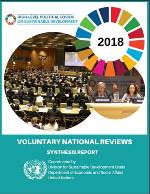Other news
Published on Wed, 2020-01-15 00:00
The WORLD Policy Analysis Center and University of California Press are thrilled to announce a new, freely downloadable book, Advancing Equality: How Constitutional Rights Can Make a Difference Worldwide. This resource pairs a quantitative analysis of the constitutions of all 193 U.N. member states with case law from more than forty countries. By systematically examining protections against discrimination on the basis of sex/gender, race/ethnicity, religion, migration status, socioeconomic status, disability, sexual orientation, and gender identity, alongside guarantees of the rights to health and education, Advancing Equality offers insights into the range and implications of different constitutional and judicial approaches to ensuring equal opportunities. |
Published on Thu, 2019-11-07 10:41
Official development assistance (ODA) and blended finance alone are insufficient in both quantum and nature to enable the finance needed to achieve the Sustainable Development Goals (SDGs), according to the UN Conference on Trade and Development (UNCTAD). This is one of the main conclusions highlighted by UNCTAD in a Secretariat Note presented at the third session of the Intergovernmental Group of Experts on Financing for Development taking place from 4-6 November. |
Published on Tue, 2019-10-22 14:25
The 5th session of the open-ended working group on transnational corporations and other business enterprises with respect to human rights (OEIGWG) met in Geneva on 14 to 18 October 2019. This marked the beginning of intergovernmental negotiations on the basis of a revised draft legally binding instrument (LBI) published in July 2019. Kinda Mohamadieh, from Third World Network, says the 5th meeting of the OEIGWG was a success in advancing the discussions and clarity on various elements of the revised text. Yet, some core issues continue to generate different approaches in the working group, including the scope of the proposed treaty, the extent of new obligations that the proposed treaty should impose on States, the possibility and ways of addressing direct obligations of business enterprises, and the scope of human rights law to be covered under the LBI. |
Published on Wed, 2019-05-08 21:02
Diversification, in addition to an effective risk management strategy, remains crucial for commodity-dependent developing countries in order to increase resilience and reduce macroeconomic risks related to the commodity sector. This is one of the main conclusions highlighted by the UN Conference on Trade and Development (UNCTAD) in a Secretariat Note presented at the eleventh session of the multi-year expert meeting on commodities and development. |
Published on Mon, 2019-02-25 12:30
A majority of the 3.3 billion people employed globally in 2018 experienced a lack of material well-being, economic security, equal opportunities or scope for human development, the International Labour Organisation (ILO) has found. In its latest World Employment and Social Outlook report released last week, the ILO pointed out that being in employment does not always guarantee a decent living. "Many workers find themselves having to take up unattractive jobs that tend to be informal and are characterized by low pay and little or no access to social protection and rights at work." |
Published on Fri, 2019-02-15 16:43
The statement of the NGO Committee on Financing for Development, was submitted to the UN Financing for Sustainable Development Office as a stakeholder input to the 2019 report of the Inter-Agency Task Force on Financing for Development. A major part of the statement is about social protection, which is a theme this year in the Commission on Social Development, Commission on the Status of Women, and the Financing for Development Follow-up Forum. |
Published on Fri, 2019-02-08 18:42
Human rights must be an integral component of policymaking to ensure economic reforms help advance societies, rather than hinder people’s lives, an independent expert appointed by the Human Rights Council said. Juan Pablo Bohoslavsky, the Independent Expert on foreign debt and human rights, published the Guiding Principles on Human Rights Impact Assessments of Economic Reforms to assist States, international financial institutions, creditors, civil society and others to ensure that economic policies are embedded in human rights. They will be presented to the Human Rights Council on 28 February 2019. “The thrust of the Guiding Principles is that States cannot shy away from their human rights obligations in economic policymaking at all times, even in times of economic crisis,” said Bohoslavsky. |
Published on Tue, 2018-12-04 09:30
Major developed countries on Saturday succeeded in foisting, in the final G20 Leaders' Declaration from Buenos Aires, "reforms" at the World Trade Organization ostensibly to salvage the multilateral trading system from "falling short of its objectives", trade envoys told SUNS. Despite the writing on the wall that the multilateral trading system is being subjected to trade wars launched by the United States for pursuing its "America First" trade policies, the G20 Sherpas meekly agreed to the US demand to shift the blame for the current crisis in global trade to the multilateral trading system and the WTO, said a trade envoy, who asked not to be quoted. During the crucial negotiations among the Sherpas of the 19-member G20 in Buenos Aires on 30 November, the developing countries, especially South Africa and India among others, resisted the use of the term "reforms" at the WTO, and its negative effects on the developing and poorest countries, said a trade envoy, who asked not to be quoted. |
Published on Fri, 2018-11-16 14:52
The third annual Synthesis Report of the voluntary national reviews (VNRs) is now available. The report was coordinated by the Division for Sustainable Development Goals of the United Nations Department of Economic and Social Affairs. The third annual Synthesis Report of the voluntary national reviews (VNRs) is now available. The 'Voluntary National Reviews 2018: Synthesis Report' synthesizes some of the findings of the 46 VNRs presented at the HLPF in July 2018. The report was coordinated by the Division for Sustainable Development Goals of the United Nations Department of Economic and Social Affairs. |
Published on Fri, 2018-11-16 06:43
Widespread privatization of public goods is systematically eliminating human rights protections and further marginalising the interests of low-income earners and those living in poverty, a United Nations human rights expert has said. In a recent report to the UN General Assembly, the Special Rapporteur on extreme poverty and human rights, Mr Philip Alston (from Australia), said that existing human rights accountability mechanisms are clearly inadequate for dealing with the challenges presented by large-scale and widespread privatization. "Privatizing the provision of criminal justice, social protection, prisons, education, basic healthcare and other essential public goods cannot be done at the expense of throwing rights protections out of the window," Mr Alston said. |
SUSCRIBE TO OUR NEWSLETTER










